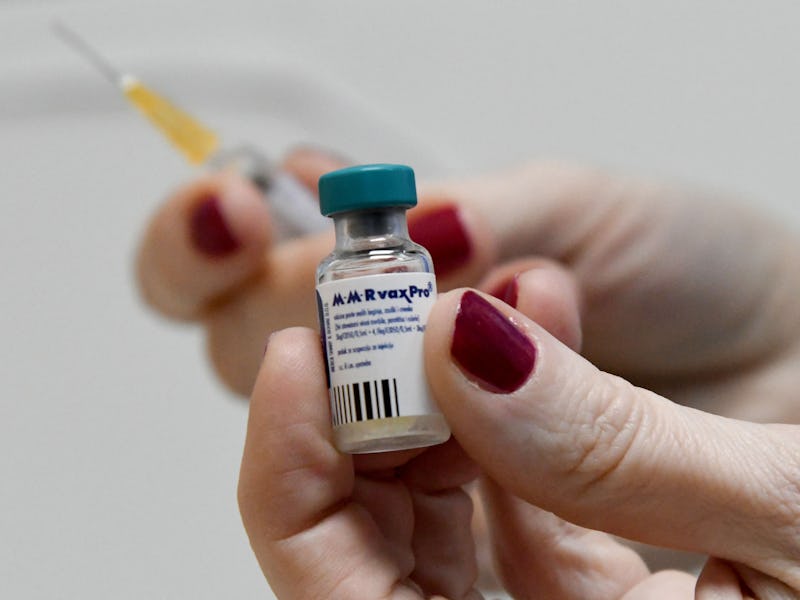Do You Need A Measles Booster? Your Birth Year Will Reveal The Answer
The highly effective vaccine is the only way to stop this contagious virus in its tracks.

Measles, a highly infectious disease that the U.S. eliminated in 2000, is, once again, rearing its ugly, contagious head. Around two dozen cases have appeared in Pennsylvania, New Jersey, Delaware, and Washington, D.C., mostly among unvaccinated children and adolescents. In an advisory sent last month, the Centers for Disease Control and Prevention (CDC) urged healthcare providers to be on alert for any signs of measles, especially among those who recently traveled abroad.
Measles spreads easily and can linger in a space suspended within small droplets for one or even two hours after a contagious person has vacated that space, Graham Snyder, medical director of Infection Prevention and Hospital Epidemiology at the University of Pittsburgh Medical Center, tells Inverse. He says this makes measles particularly pernicious.
While there’s no antiviral treatment for measles, the vaccine is the only method ensuring over 90 percent immunity, eliminating the spread and transmission of the infection. With this spike in cases, should people consider getting a booster shot? Snyder and Walter Orenstein, the associate director of Emory University’s Vaccine Center, told Inverse that the easiest way to tell if you need a booster is to consider the year you were born.
If you were born before 1963
No vaccines for measles were available during this time, although clinical trials in children were underway. According to the Centers for Disease Control and Prevention, individuals born before 1963 most likely have immunity from natural infections since, at that time, measles was a common childhood disease. They, therefore, are “presumed to be protected against measles, mumps, and rubella” under what’s called presumptive immunity. There are some infrequent exceptions to this rule. In some people, immunity from measles may wane over time, says Orenstein, but that’s pretty rare. But they may need to be vaccinated at least with one dose of the measles, mumps, and rubella (or MMR) vaccine if they don’t have proof of immunity (typically with a blood test).
If you were born between 1963 and 1968
From 1963 to 1967, an inactivated (or killed) measles vaccine was introduced in the U.S., but it was discovered that it didn’t offer as much protection and, in some people who contracted measles after the vaccine, it led to them developing what is called atypical measles syndrome, a condition characterized by high fever, headache, and abdominal pain. An early version of the current live attenuated (or weakened) virus became available in 1963. If you received the shot containing the inactivated virus — or any other type of measles jab that wasn’t the live vaccine — it’s recommended you get re-immunized with at least one dose of the MMR shot.
If you were born between 1968 and 1971
You’re probably fine if you received one dose of the live attenuated measles vaccine, which was released by Merck in 1968 as a standalone shot. Snyder says the CDC recommends anyone who doesn’t meet the criteria of presumptive immunity and was vaccinated with an unknown vaccine get vaccinated with one or two doses depending on whether they’re at a higher risk of exposure and transmission, such as healthcare professionals and international travelers.
If you were born between 1971 and 1989
The standalone measles vaccine was grouped with the mumps and rubella vaccines in 1971 as a single jab with one dose and called the measles, mumps, and rubella (or MMR) vaccine. It eventually expanded to a two-dose schedule in 1989, but even one dose is extremely effective, at over 93 percent. If you have documentation of getting a least one dose of the MMR vaccine, the CDC doesn’t recommend another one unless, again, you find yourself at a high risk of getting measles, such as if you’re a healthcare professional or traveling abroad.
If you were born after 1989
The CDC expanded the one-dose series to a two-dose series in 1989, so if you were born from 1990 onward, you almost certainly received two doses, meaning you are likely set for life.
“The measles vaccine, like many vaccines, is a medical cure,” says Snyder. “You get two doses of the vaccine as part of your childhood schedule, and you have greater than 95 percent protection against getting sick from measles. It’s incredibly effective.”
Vaccination is key
In the U.S., most measles outbreaks have been due to international travel, where an unvaccinated or partially vaccinated individual catches measles, brings it back with them, and spreads it to other unvaccinated individuals. For example, an outbreak of measles in Ohio in February 2023 involved 85 children, 81 of whom were unvaccinated. The largest outbreak since 1992 happened in 2019, with over 1,200 cases mostly associated with the unvaccinated.
The decline of childhood measles vaccinations over recent years is also another contributing factor, thinning out the herd immunity we need to prevent measles spread and protect vulnerable communities like immunocompromised individuals.
“Before we had a vaccine, we used to have at least four or five million cases a year as well as deaths from measles,” says Orenstein. “It’s unfortunate that we’re seeing [these outbreaks] because, while hopefully someday we can eradicate measles, as long as we have unvaccinated individuals, we run the risk of outbreaks.”
If you and other family members are unvaccinated, Snyder and Orenstein highly recommend getting the shot.
“If you haven’t been vaccinated and you get measles, you have a one in five chance of being sick enough to be hospitalized,” says Snyder. “Those aren’t particularly good odds.”
This article was originally published on